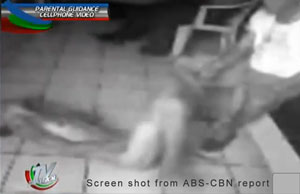 The Asian Human Rights Commission (AHRC) welcomes the decision of the Department of Justice (DoJ) after its investigation to prosecute the policemen seen in a torture video in August 2010 for violation of the Anti-Torture Act of 2009. As reported, in their 24-page resolution dated August 22, 2011, the DoJ prosecutors recommended “the filing of charges for Torture Resulting in the Death of any Person, as defined and penalized under Republic Act No. 9745(Anti-torture Act of 2009)” 1.
The Asian Human Rights Commission (AHRC) welcomes the decision of the Department of Justice (DoJ) after its investigation to prosecute the policemen seen in a torture video in August 2010 for violation of the Anti-Torture Act of 2009. As reported, in their 24-page resolution dated August 22, 2011, the DoJ prosecutors recommended “the filing of charges for Torture Resulting in the Death of any Person, as defined and penalized under Republic Act No. 9745(Anti-torture Act of 2009)” 1.
The case is regarding the torture of Darius Evangelista in the widely publicized torture video in August 2010. In the video, Darius was severely beaten and his genitals were pulled by a string by a policeman, Senior Inspector Joselito Binayug, at that time Commander of the Manila Police District’s Police Station 2.
For details about the case, please read: Story 6: Police torture caught on video
While the AHRC commends the DoJ for its landmark prosecution, the first known case wherein security forces would be tried for violation of the Anti-Torture Act of 2009 since its enactment; however, it expresses disappointment at the delay in the conclusion of its investigation. It took the DoJ one year to conclude whether or not there is a criminal liability on part of the policemen involve.
The AHRC has time and again, expressed concern over the delay in the determination of probable cause by prosecutors investigating the worst form of human rights violations, particularly torture and extrajudicial killings. On cases of torture, the Anti-Torture Act of 2009 has reaffirmed the victim’s rights to: “prompt and an impartial investigation”, however, the absence of a mechanism where prosecutors and investigators who fail to comply to this has resulted in cases being pending for years.
Apart from the Darius case, the AHRC has documented in its Article 2, Special Report: Torture in the Philippines & the unfulfilled promise of the 1987 Constitution (Vol. 10 – No. 01 March 2011) ten other cases of torture since the law was enacted. The perpetrators here, to our knowledge, have not been charged in court for a variety for reasons such as failure of the prosecutors and investigators to conclude its investigation, victims losing interest to prosecute due to delay and lack of protection, amongst others.
The AHRC, therefore, urges the Government of the Philippines, particularly the Department of Justice (DoJ) and Commission on Human Rights (CHR), the two agencies having the primary obligation to implement the Anti-Torture Act, to develop further an effective mechanism to prevent needless delays in investigating torture case. The promptness of the conclusion of their investigation and prosecution in cases involving the security forces is extremely important.
For more information on the obstacles in the implementation of the Anti-Torture Law please see:
The limitations of the Philippines’ Anti-Torture Act
Overcoming the failure of the 1987 Constitution of the Philippines: Changing the operating structures of an authoritarian regime
———
Footnote:
1. ABS-CBN, September 13, DOJ OKs filing of torture raps vs Binayug et al, http://www.abs-cbnnews.com/nation/metro-manila/09/13/11/doj-oks-filing-torture-raps-vs-binayug-et-al